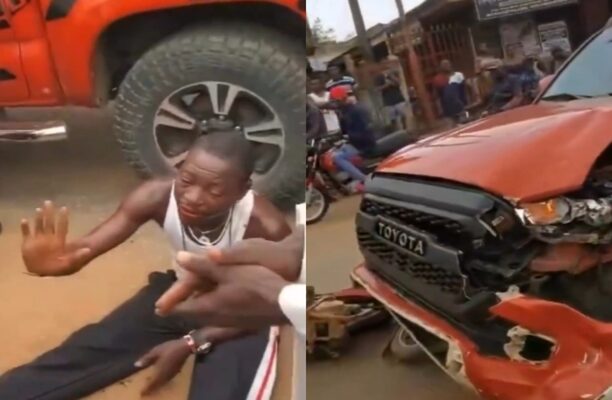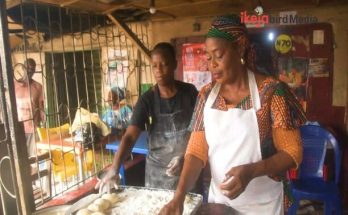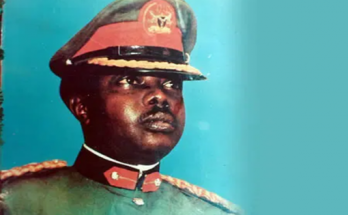By Sunkanmi Adewunmi
Edited by Ezennia Uche
A chaotic video from Sagamu (Ogun State) captured DJ Chicken’s SUV after it plowed into a motorcycle. The Lagos-based TikTok star and street DJ (Ademola Abiodun) collided with a bike carrying a woman, leaving both injured. Eyewitnesses immediately blamed his “reckless driving” – one clip even noted he was accused of “driving under the influence” at the time of the crash. By the time police arrived, a mob had surrounded and restrained the entertainer, furious at the accident.
DJ Chicken (real name Ademola Abiodun) is known for his street-party DJ mixes and viral TikTok content. He has a history of public controversies: for example, he made headlines for insulting superstar Davido and his wife Chioma, and for taunting rapper Olamide (Baddo) on social media. He has even had online spats with music icon Wizkid. This reputation as a provocative, confrontational figure partly explains why Nigerians on social media were quick to accuse him of wrongdoing after the crash.
Public reaction to DJ Chicken’s accidents has been intense. A widely-shared image shows him injured on the ground next to his mangled vehicle, surrounded by angry bystanders. Many Nigerians voiced outrage online. One user wrote: “Jungle justice for a celebrated jester… what are the solutions as a country bayii?”, reflecting frustration that ordinary authorities hadn’t intervened. Another commenter bluntly noted that “Hit and run is NEVER okay, celebrity or not”. In other words, the crowds took matters into their own hands and demanded accountability – a sign of how seriously people view drunk-driving offenses.
Nigeria’s Drinking-and-Driving Law
Nigeria does have strict laws on paper. The Road Safety Act (2007) makes it an offense to operate a vehicle while impaired, and explicitly sets the blood-alcohol concentration (BAC) limit at 0.05 g/100 mL. Under the law, offenders can face a fine of ₦5,000 or up to two years’ imprisonment (plus license suspension or vehicle impoundment). In practice, however, enforcement has been weak. Researchers note that although a 0.05 limit is on the books, “enforcement of the law is weak because alcohol testing equipment is unavailable”. A 2021 study of Nigerian traffic officers found that only about 5% had ever used a breathalyzer in the field, with the rest relying on subjective judgment. In short, many suspected drunk drivers are never formally tested or prosecuted, even if the law is clear.
Enforcement Reality: Arrests and Stats
Official stats on DUI arrests are relatively low. For example, the Federal Road Safety Corps (FRSC) – Nigeria’s highway patrol – reported 417 motorists arrested for drunk-driving in Lagos State between Jan–Sept 2023. Nationwide in 2017, the FRSC recorded 238 such arrests over the same nine-month span. By comparison, total traffic stops are huge (for instance, FRSC arrested ~456,000 offenders nationwide in 2020 for all violations). This suggests DUI is a small fraction of cases.
- Lagos State (Jan–Sept 2023): 417 drivers arrested for DUI.
- Nigeria (Jan–Sept 2017): 238 drivers arrested for DUI.
These figures indicate that, despite periodic crackdowns, many cases may go undetected. In fact, the FRSC admitted that “we do record more than 1,000 [traffic] contraventions monthly, and arrests have not deterred people”. As a result, the Corps says it is now combining enforcement with driver education and sensitization to address the problem.
Looking Ahead
In summary, Nigeria has a drink-driving law on the books, but putting it into practice remains a challenge. The DJ Chicken saga – a high-profile figure causing a crash – has highlighted this gap. Analysts stress the need for better enforcement: equipping police and FRSC with breathalyzers and training, and routinely testing drivers suspected of intoxication. Until then, many Nigerians fear that drunk drivers (celebrity or not) will escape punishment. The public outcry (“jungle justice,” as one user dubbed it) shows how passionately people want the law applied equally. As one FRSC official noted during recent holiday patrols, strict enforcement of drinking-and-driving rules (especially in the busy “ember” months) is essential – but only time will tell if arrests and education finally turn the tide.








